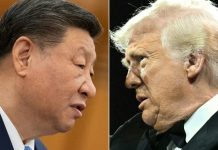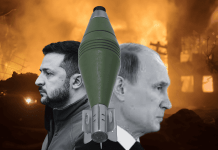The race to stockpile Russia and Ukraine’s artillery arsenal has unexpectedly drawn in the two other rivals, North Korea and South Korea, into the conflict.
Following reports of North Korea transferring artillery rounds to Russia, Seoul could provide artillery shells to Ukraine for the first time.
On November 10, The Wall Street Journal reported that a classified arms pact between Seoul and Washington would allow South Korea to transfer artillery shells for the first time to Ukrainian forces.
According to US officials familiar with the agreement who spoke to the outlet, the US will acquire 100,000 rounds of 155mm artillery ammunition from South Korean manufacturers. The number of artillery ammunition Washington is considering sending Ukraine would be enough to last at least several weeks of fierce combat.
The agreement comes when Ukrainian officials demand more weapons to focus on a counteroffensive that is driving Russian forces out of certain areas they had occupied in the initial stages.
The armaments supplied by South Korea will allow the US to arm Ukraine without depleting the US stockpile of ammunition, which US officials have said is rapidly running out. If reports are correct, the latest move represents a global hunt for artillery munitions following months of the Ukraine-Russia war.

In August, the Pentagon had expressed concern about the diminishing American 155mm artillery stockpile, and the situation has worsened since then. The decision would alleviate stockpile pressure concerning the howitzer ammunition that Ukrainian forces have been utilizing heavily.
In June, Vadym Skibitsky, deputy head of Ukraine’s military intelligence, said that Ukrainian forces use 5,000 to 6,000 artillery rounds daily in the ongoing war against Russia. On the other hand, Russia was firing roughly around 20,000 rounds daily.
In a statement, South Korea’s Defense Ministry acknowledged ongoing discussions about selling an undefined amount of 155-millimeter artillery shells to replenish depleted US supplies.
However, the ministry stated that the negotiations are proceeding under the assumption that the United States will be the “end user” of those rounds and that Seoul will continue to provide solely non-lethal assistance to Ukraine.
By channeling the agreement through the United States, South Korea can uphold its public vow not to deliver lethal military aid to Ukraine while supporting Washington, Seoul’s most important partner in deterring North Korea.
North Korea Supplying Shells To Russia
The South Korea deal offers a stark counter to concerns that North Korea is clandestinely transporting artillery to Russia.
The White House recently claimed that North Korea sent artillery rounds to Russia. This presented an unprecedented situation where opposing European forces could use weapons from the two Asian nations.
The arms deals also serve as a reminder of the US and Russia’s industrial bases’ limitations, which the Ukraine War has severely strained.
Pyongyang has sided with Moscow in the deadly Ukraine-Russia war while simultaneously holding the United States responsible for the crisis. The country claimed that the West’s “hegemonic policy” compelled Russia to use military action to defend its security interests.
In September, US authorities stated that Russia was in the process of procuring rockets and artillery shells from North Korea. Later, North Korea denied that allegation, asking Washington to stop making “reckless remarks.”

Besides that, South Korea had previously restricted its assistance to non-lethal supplies and equipment for Ukraine. Following Russia’s attack on Mariupol in April, Ukrainian President Volodymyr Zelenskyy asked South Korea to deliver lethal weapons. But Seoul rejected Ukraine’s request at the time.
Meanwhile, observers argued that the compatibility of North Korea’s military hardware, which has Soviet origins, might make it a significant supplier of ammunition for Russia.
In return, North Korea could ask for Russian technology and fuel transfers to strengthen its military capabilities as it pursues more powerful missiles and nuclear bombs.
Furthermore, security analysts believe North Korea and South Korea keep sizable arsenals of munitions due to the long-standing tensions along their strongly guarded and militarized shared border.
- Contact the author at ashishmichel@gmail.com
- Follow EurAsian Times on Google News




